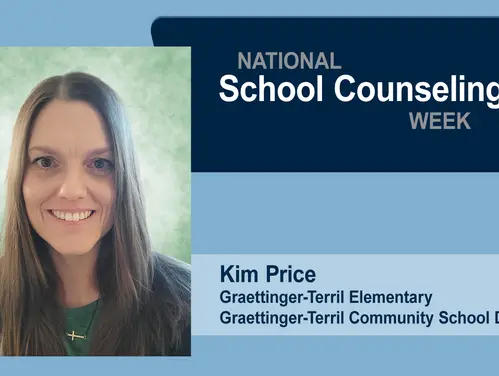It’s National School Counseling Week, which honors the important contribution of school counselors in our schools and the significant impact they have in supporting students. This week, we salute Iowa’s nearly 1,400 school counselors.
Each day this week, we will highlight a school counselor from across the state.
Today we focus on Kim Price, a counselor at Graettinger-Terril Elementary in the Graettinger-Terril Community School District. She’s been a counselor for eight years. We asked her thoughts about being a counselor.
What attracted you to counseling?
I have always known I wanted to help children. After college, I worked for a juvenile treatment facility. I knew those kids ended up in treatment because of their actions, but the real issue was what happened to them and their lack of knowledge and understanding of how to deal with it. This ultimately led to their negative actions that ended them in placement. I thought that becoming a school counselor and working with elementary-aged children could help prevent them from ending up in treatment. Another reason is because when I was growing up, I had one important trusted adult in school that I could count on, and I knew I could always go to them for anything. That person was integral to my success in school and beyond. I wanted to be that person for someone and going into school counseling would give me that opportunity.
Over the years, counseling has expanded to include many different things. How do you juggle it?
I prioritize what needs to be done and focus on the most important things first. Of course, effective time management is necessary to be able to juggle all the responsibilities. I am glad counseling has expanded over the years. That’s one reason I believe school counselors now have much more of an impact than they did in the beginning of the profession.
What’s the most satisfying part of your job? Can you name something specific that sticks out in your mind?
It’s hard to choose just one thing. I love it when I see or hear students demonstrate skills that I have taught them in class or group. I also love seeing when someone has struggled socially and/or behaviorally and they make improvements and experience success. Getting to see all the smiling faces every day is also a very satisfying part of my job.
What are your biggest challenges?
Probably the biggest challenge is finding the right time to pull kids for individual and group counseling. Their core instruction is so important and oftentimes the students who may need additional help with social emotional needs also have academic needs and neither the teachers nor I want them to miss class time.
What do you know now that you wish you knew when you first became a counselor?
I’ve learned over the years the importance of self-advocacy. I know how crucial social emotional learning (SEL) is for all educators and that training on SEL topics, such as managing emotions, setting and achieving positive goals, establishing and maintaining positive relationships and making responsible decisions, is necessary. In recent years I’ve had the opportunity to lead trainings for staff and believe this has been beneficial for all. I also wasn’t aware of ACES (adverse childhood experiences) when I first became a school counselor and learning about ACES and trauma was very eye opening and really shifted a lot of what I did as a counselor. That knowledge and understanding is at the foundation of my program now.
What advice do you have for new counselors just entering the field?
Advocate for yourself and your position. Build a comprehensive program. Reach out to others for help. Take care of yourself. Know you can’t do it all and that’s okay. When it’s hard, remember why you went into counseling. Breathe. Smile. Laugh a lot.
Subscribe to receive email updates from the Iowa Department of Education.
